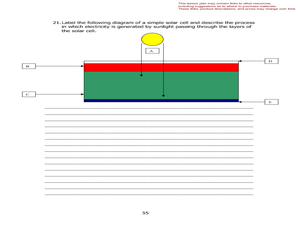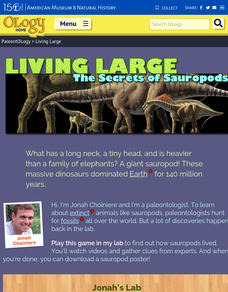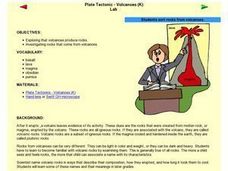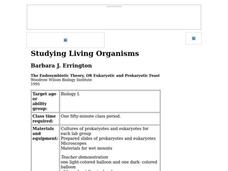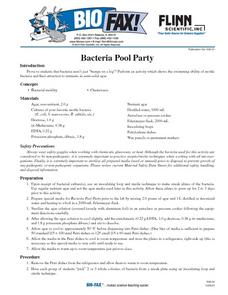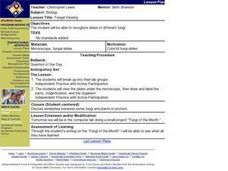Curated OER
Plankton / Phytoplankton
Learners discuss the importance of plankton in the ocean ecosystem. For this biology lesson, students identify the different types plankton by observing them under the microscope. They explain how plankton population affect global climate.
Curated OER
Stem Cells: 5 Year Progress Report
Students explore different aspects of stem cells. In this human biology lesson plan, students complete numerous activities including reading an article and discussing it, watching a video on stem cells reproducing over time, and...
Curated OER
Life Cycle: Diversity in a Balance
In this life cycle workbook, 3rd graders complete several different activities in which they analyze different invertebrates, identify arthropods, examine human biology and plants, and study natural environments. 20 different activities...
Curated OER
Photovoltaics and Solar Energy
Students experiment with photovoltaic cells and determine the energy use of their appliances. In this renewable energy lesson plan, students calculate the energy emitted by a photovoltaic cell through an inquiry-based lab. They keep...
National Nanotechnology Infrastructure Network
Powers of Ten with the Blue Morpho Butterfly
Explore the powers of ten while examining a Blue Morpho butterfly wing. Learners discover there is a lot more than meets the eye when one looks close enough.
American Museum of Natural History
Living Large
Get to know all about sauropods from a paleontologist, Jonah. Following an introductory video, scholars choose from five fossils to learn more about. Each fossil begins with a video, provides information from several different...
Curated OER
What Is an Egg Without its Shell?
Students observe osmosis, a cellular process that normally can't be observed without a microscope, and use scientific method to observe osmosis in a chicken egg.
Curated OER
The Great Archeological Dig
Students explore biology by identifying a diagram. In this cell anatomy instructional activity, students read a story about archeology and conduct a fictitious archeology dig in class in which they search for animal cells. Students...
Curated OER
DRY UP BABY ! ANHYDROBIOSIS (freeze drying)
In this lab, students explore how organisms are able to survive the extreme environmental conditions found in the Polar regions. Students observe and draw active living rotifers and Tardigrades, design and perform experiments to collect...
Curated OER
Wacky Water Critters
Students visit a local creek or stream. They collect water samples from the creek and observe and sort the "water critters" they find in the sample, observing smaller organisms under a microscope if necessary. They identify each organism...
Curated OER
Endosymbiosis: A Friend Within
Young scholars research the ecological principle of symbiosis. Using a microscope, students observe the relationship of mutualism between termites and flagellates. Young scholars examine a live termite and protozoans. They discuss the...
Curated OER
Elegant Embryology
Students observe embryogenesis in action through early stages of development of eggs. They observe cultures with dissecting and compound microscopes. They draw their egg, record any details and observe for changes. They compare their...
Curated OER
Studying Living Organisms
Students are introduced to Hardy-Weinberg Equilibrium without recourse to algebra. After participating in this activity, students gain a feeling for the significance of the Hardy-Weinberg Equilibrium without using algebra.
Curated OER
And the Bacteria Ran Away with the Petri Dish
Sixth graders complete a think, pair, share activity on an antibiotic overhead. In groups, they participate in an exercise in which they can see how germs behave and how they are treated. To end the lesson, they discuss how a...
Curated OER
The Internal Anatomy of the Grasshopper
Sixth graders explore the internal organs of grasshoppers. They determine the function of the organs through a dissection activity.
Curated OER
Interdisciplinary Approach to Investigating Popcorn
Students conduct a lab experiment using the scientific method. In this interdisciplinary lesson plan, students will test the difference in popping white and yellow corn. Students will write their lab report in their science, math,...
Curated OER
Species Diversity and Phylogeny
Students explore the classification system of organisms: taxonomy. They examine prepared slides of Protozoans and record information on a Taxonomy Recording Sheet. Two additional classifying activities are also included in this lesson.
Curated OER
Bacteria Pool Party
Students investigate the organisms of bacteria. They are given a culture of bacteria that can be observed under a microscope. The students make observations that are recorded. The lesson includes the mention of specific safety...
Curated OER
Water Quality Monitoring
Learners study the water quality of a stream in their area, by measuring the temperature, pH, alkalinity and conductivity. They integrate biology with earth science when using the microscope to study the living organisms in the water.
Curated OER
Pollen Tube Growth
Learners demonstrate the proper usage of the compound and dissecting microscopes. They identify the parts of a flower and the functions of the flower parts. Students describe the process of gamete formation and fertilization in a flower.
Curated OER
Physical Difference and Classification
Learners use a microscope and observation skills to compare and contrast several physical properties and develop a classification system.
Curated OER
Fungal Viewing
Learners recognize slides of different fungi. They work in lab groups. Students view slides under the microscope, then draw and label the parts, magnification, and the organism. Learners discuss similarities between some fungi and...
Curated OER
Ecosystems
Sixth graders perform various labs, create presentations, and do hands on activities to explore the ecosystem.





